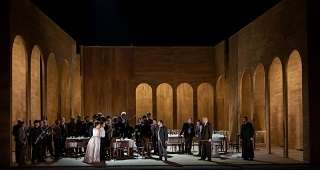|
Back
The Capulets and Montagues in Sicily Roma
Teatro Costanzi
01/23/2020 - & January 26, 28*, February 1, 4, 6, 2020
Vincenzo Bellini: I Capuleti e i Montecchi
Vasilisa Bezhanskaya (Romeo), Benedetta Torre*/Mariangela Sicilia (Giulietta), Iván Ayón Torre*/Giulio Pelligra (Tebaldo), Nicola Ulivieri (Lorenzo). Alessio Cacciamani (Capellio)
Coro del Teatro dell’Opera di Roma, Roberto Gabbiani (chorus master), Orchestra e Teatro dell’Opera di Roma, Daniele Gatti (conductor)
Denis Krief (stage director, sets, costumes and lighting)

(© Yasuko Kageyama)
I Capuleti e i Montecchi, Bellini’s take on Romeo and Juliet, is inspired by the original Italian source rather than Shakespeare’s play. Despite Felice Romani’s poetically rich lyrics, this work is dramatically less powerful than Gounod’s more famous Roméo et Juliette on the same story. However, it is at least as powerful musically. Bellini’s melodies are as haunting in this opera as they are in his more popular operas La somnambula, Norma and I puritani. The assignation of the role of Romeo to a mezzo rather than a tenor affords a more sensual bel canto musical score. Young Russian mezzo Vasilisa Bezhanskaya was a perfect choice for the role of Romeo. Her agile voice, beautiful and warm timbre, excellent technique and capable acting made her a credible and charismatic Romeo. Thanks to her posture and movement on stage, she managed to convince as a young man. Her Act I “Se Romeo t’uccise un figlio” was appropriately touching thanks to an amazingly good diction in Italian. Her voice blended well with Benedetta Torre’s light lyric soprano. Torre’s light and fruity timbre made this Giulietta both touching and credible as the unfortunate young woman. Without excess, she was able to convey sadness through her timbre as well as her phrasing in her Act I “O quante volte”. Despite a promising voice, Peruvian tenor Iván Ayón Torre was stylistically out of his depth. His constant forte singing would have appealed in verismo but was offensive in this bel canto opera. Despite his sensitive conducting of Bellini’s score, conductor Daniele Gatti bears some of the responsibility for this stylistic blemish. Nicola Ulivieri’s Lorenzo was vocally exemplary. With such an excellent singer, one wished his role had been as important as Gounod’s Frčre Laurent. Alessio Cacciamani’s Capellio was more than adequate.
In contrast to the overall beautiful singing and excellent music making, the staging was quite painful. French stage director Denis Krief seems to have set Mascagni’s Cavalleria rusticana rather than Bellini’s opera. The noblemen were dressed in black Sicilian peasant grab and looked more like ruffians. The epoch was transposed to the early to mid-20th century. Swords were replaced by guns. Nothing in the sets indicated Verona as the place where the story takes place. On the contrary, it very much looked like a little Sicilian village and one expected Mama Lucia to come out and reprimand Turridu! The wedding banquet looked like a modest celebration in the village tavern or a modest church parish. One understands the universality of the story of the star-crossed lovers from rival clans, but why this particular choice? Does it bring any new insight into the story, or is it just a means of producing sets and costumes that are substantially less costly and much less appealing? Despite the overall ugliness, there were a few good ideas, such as Giulietta’s wedding dress displayed on a mannequin in the young girl’s bedroom, a foreboding sign of her upcoming forced wedding to Tebaldo. Especially hideous was Giulietta’s tomb that looked like a low cost sci-fi structure and seemed totally impractical and out of style with the “Sicilian peasant” sets. Krief’s sets, costumes and staging are the best advocate for “opera in concert” rather than staged productions being a regular part of an opera season.
Ossama el Naggar
|